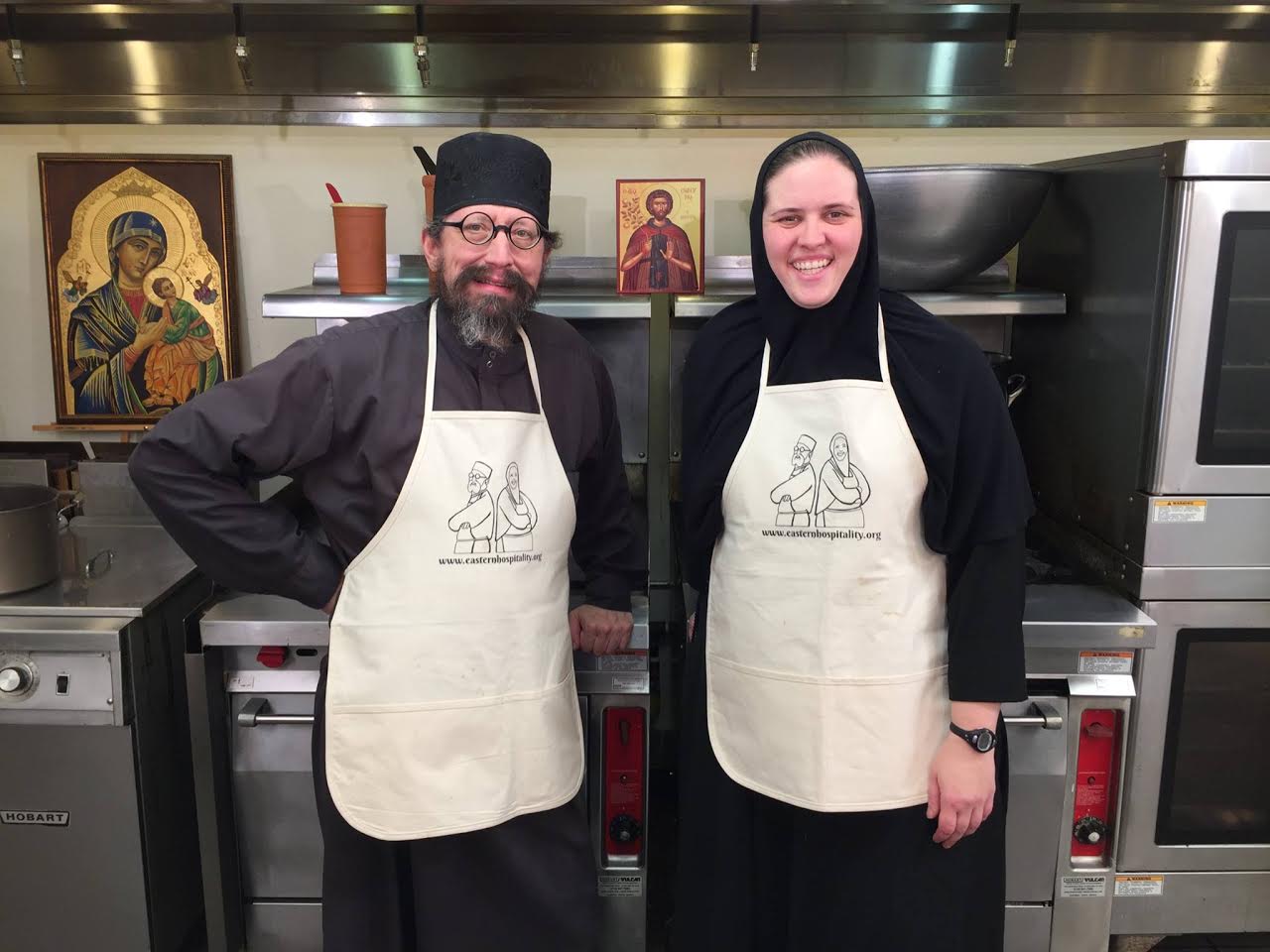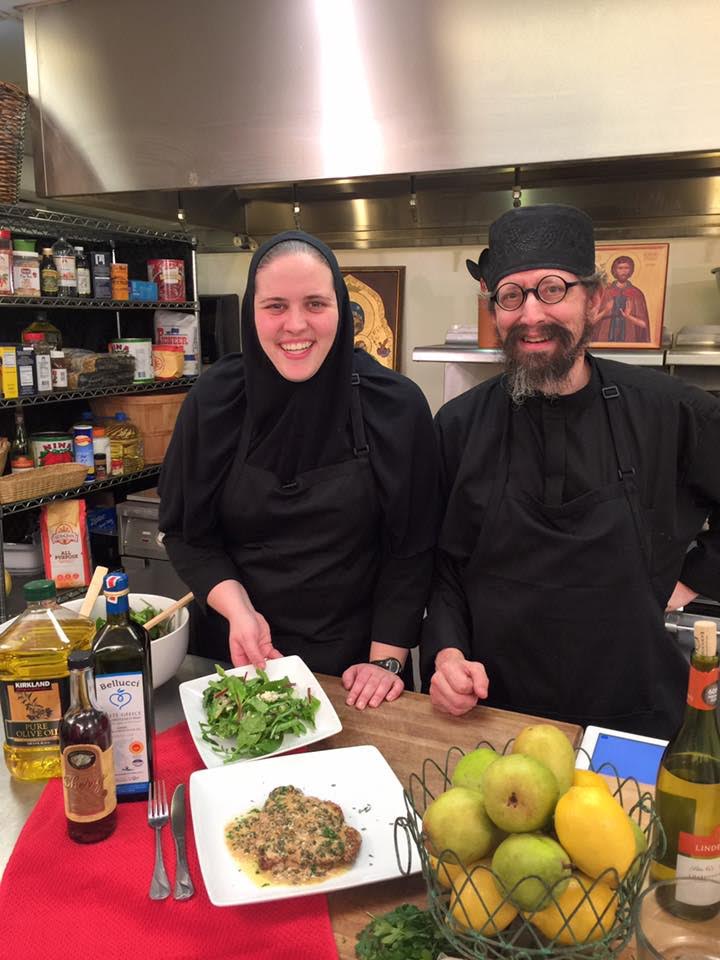‘Eastern Hospitality’ showcases recipes from a monastery kitchen and food for thought from spiritual masters.
Lenten Campaign 2025
This content is free of charge, as are all our articles.
Support us with a donation that is tax-deductible and enable us to continue to reach millions of readers.
At a time when Christians are supposed to be “giving up stuff,” what are a monk and a nun doing in the kitchen cooking tasty meals?
All Lent long, the two religious have been producing weekly cooking programs, tempting viewers to think about food rather than encouraging them to practice self-denial.
But there’s more to their web-based program, Eastern Hospitality, than meets the palate.

Reminiscent of other religious-themed cookbooks and TV programs — such as Brother Victor Antoine’s monastery recipes or Father Leo Patalinghug’s Grace Before Meals — Eastern Hospitality blends simple recipes with food for thought. Each web-based program, running between 15 and 30 minutes, brings in a guest speaker to offer a spiritual reflection. Both the cooking and the reflection are tied to the current religious season or upcoming commemoration.
But it all takes on an Eastern flavor, since it’s produced by Eastern Catholic religious—hence the name. The hosts, Mother Gabriela and Abouna Moses, follow religious practices with roots in the Orthodox Church.
And though the vehicle for their message involves cooking, the aim the two have is to help people better integrate religious practices, including fasting, prayer and charity, into their daily lives.
“I think we’re trying to encourage people to live the faith by practicing the traditions of the Church,” said Abouna (or Father) Moses, who is a monk at Holy Resurrection Monastery in St. Nazianz, Wisconsin. “Those have been lost over the years for all kinds of reasons, so we’re trying to help people reconnect with the traditions.”
“We’re trying to use media to help with the new evangelization and make the fast and the traditions of the Christian churches more acceptable and realistic and available to those who wish to incorporate them into their daily faith life,” added Mother Gabriella, a nun at Christ the Bridegroom Monastery in Burton, Ohio.
Together, they appear on camera in the kitchen of the Cathedral of St. John the Baptist of the Byzantine Catholic Eparchy of Parma, Ohio. To the side is a large icon of Mary and Jesus, and on the shelf of the stove is an icon of St. Euphrosynus, patron of cooks in the Orthodox tradition.
Aside from their black habits, Abouna Moses and Mother Gabriella look very comfortable amid the pots and pans. Abouna Moses actually worked as a chef for several years before entering religious life, while Mother Gabriella recalls growing up in a family that included a Hungarian grandmother cooking things like chicken paprikash.
The two chefs are keen on helping people better understand the nature and purpose of fasting. In the Byzantine tradition, fasting means eating less, not necessarily abstaining altogether. But Eastern Christians who take fasting seriously generally do abstain from not only meat but also dairy products, wine and oil.
In Mother Gabriella’s experience, when people hear that, they often exclaim, “Then what do you eat?”
The video series attempts to answer that question by providing ideas. “Well, here’s something you can make that’s healthy and nutritious and won’t take you 20 hours to prepare,” she explained.
And, she insists, food should taste good, even when you’re fasting. And even when you’re whipping up some vegan recipes that come from their own monasteries
If fasting is the driver for this particular cooking show, Eastern Hospitality will have lots of material. The Byzantine Church actually has four fast periods throughout the year. Mother Gabriella and Abouna Moses premiered the show in November, at the beginning of the Nativity Fast, the 40-day period of preparation for Christmas, paralleling Advent in the Roman Catholic Church. Several weeks after Easter, there will be the Apostles Fast, a period leading up to the Feast of Saints Peter and Paul. And in August there is the Dormition Fast, to prepare for the Feast of the Assumption on August 15.
Granted, these fasts are probably little known outside Eastern Christian circles, and may nowadays largely be practiced only by monks and nuns. But fasting is an integral part of the spiritual life for all Christians. As Mother Gabriella pointed out, that life sits on three pillars like a three-legged stool: prayer, fasting and almsgiving.
“You don’t fast without prayer, and it’s hard to enter into prayer without some kind of fast,” she said. “And out of that flows charity to your neighbor.”
Fasting, she added, is intended to “free you from the sluggishness” that can come from consuming meat and dairy products.
“When you’re fasting from meat and dairy, you don’t get really full. There are a lot of vegetables and not as much protein,” she explained. “You feel lighter, because you’re not weighed down by that. … You try to live a bit more simply.”
Abouna Moses is in a perfect position to host such a program. A graduate of the Culinary Institute of America, he worked as a chef throughout the United States and Europe. He grew up in the Roman Catholic Church, and when he got a job as a chef on a yacht in Greece, it meant that he would be away from large cities for long stretches of time and have a difficult time finding a Catholic Mass on Sundays. So he received permission from the Orthodox archbishop of Athens and the Catholic archbishop of Athens to receive the sacraments in the Orthodox Church. He said he “just fell in love with” the Eastern liturgy and traditions.
“At that point I had no idea there was any such thing as a Byzantine Catholic Church,” he recalled. “It wasn’t until I came back to the States and I started talking to my pastor, and he said ‘If that’s what you’re attracted to, check out these Byzantine Catholics,’ and I said ‘What’s that?’”
In time, he discerned a calling to monasticism, where he now combines his two loves of cooking and the spiritual life.
The Christian life, of course, is not all about fasting. There’s feasting as well, and as Lent draws to a close, Abouna Moses and Mother Gabriella are preparing for their Pascha (Easter) show, in which they will describe the tradition of Easter baskets. Particularly in the Slavic traditions, these baskets contain all the goodies that have been put aside during Lent: ham, cheese, wine, oil…
And the cooking duo are planning a series for this summer, not focused so much on food as on hospitality. That, too, is an important aspect of the Christian life.









